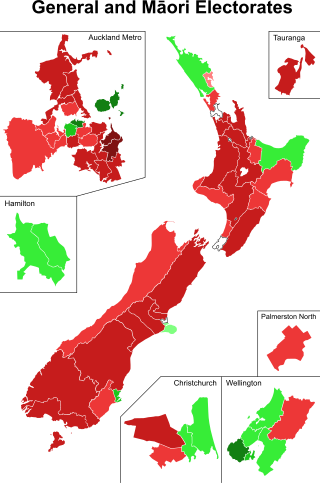
Aotearoa Legalise Cannabis Party (ALCP), also known as the Cannabis Party, is a political party in New Zealand. It is dedicated to the legalisation of cannabis for medical, recreational and industrial use. It was founded in 1996 and has stood in every general election since, but has never won representation in Parliament. Several of its members have gone on to political success after leaving the party.

The Misuse of Drugs Act 1975 is a New Zealand drug control law that classifies drugs into three classes, or schedules, purportedly based on their projected risk of serious harm. However, in reality, classification of drugs outside of passing laws, where the restriction has no legal power, is performed by the governor-general in conjunction with the Minister of Health, neither of whom is actually bound by law to obey this restriction.

Nicola Joanne Wagner is a New Zealand teacher, businesswoman and politician. She represented the Christchurch Central electorate for the New Zealand National Party in the New Zealand Parliament.

David Allister Bennett is a New Zealand former National Party politician. He was the Member of Parliament for Hamilton East from 2005 to 2020 and a list MP from 2020 to 2023. He was Minister for Food Safety and Minister of Veterans' Affairs in the final year of the Fifth National Government.

Drug liberalization is a drug policy process of decriminalizing or legalizing the use or sale of prohibited drugs. Variations of drug liberalization include drug legalization, drug relegalization, and drug decriminalization. Proponents of drug liberalization may favor a regulatory regime for the production, marketing, and distribution of some or all currently illegal drugs in a manner analogous to that for alcohol, caffeine and tobacco.

The use of cannabis in New Zealand is regulated by the Misuse of Drugs Act 1975, which makes unauthorised possession of any amount of cannabis a crime. Cannabis is the fourth-most widely used recreational drug in New Zealand, after caffeine, alcohol and tobacco, and the most widely used illicit drug. In 2001 a household survey revealed that 13.4% of New Zealanders aged 15–64 used cannabis. This ranked as the ninth-highest cannabis consumption level in the world.

In the United States, the use of cannabis for medical purposes is legal in 38 states, four out of five permanently inhabited U.S. territories, and the District of Columbia, as of March 2023. Ten other states have more restrictive laws limiting THC content, for the purpose of allowing access to products that are rich in cannabidiol (CBD), a non-psychoactive component of cannabis. There is significant variation in medical cannabis laws from state to state, including how it is produced and distributed, how it can be consumed, and what medical conditions it can be used for.

Cannabis is a plant used in Australia for recreational, medicinal and industrial purposes. In 2019, 36% of Australians over the age of fourteen years had used cannabis in their lifetime and 11.6% had used cannabis in the last 12 months.

NORML New Zealand is a cannabis law reform organisation in New Zealand. It is a National Chapter of the National Organization for the Reform of Marijuana Laws (NORML).
Ian Robert Flockhart McKelvie is a New Zealand politician. He represented the National Party in the New Zealand House of Representatives from 2011 to 2023.

The legal history of cannabis in the United States began with state-level prohibition in the early 20th century, with the first major federal limitations occurring in 1937. Starting with Oregon in 1973, individual states began to liberalize cannabis laws through decriminalization. In 1996, California became the first state to legalize medical cannabis, sparking a trend that spread to a majority of states by 2016. In 2012, Washington and Colorado became the first states to legalize cannabis for recreational use.

Cannabis in Utah is illegal for recreational use. Possession of small amounts is punishable as a misdemeanor crime. Medical use was legalized by ballot measure in November 2018, after a CBD-only law was passed in 2014 and a limited "right to try" law was passed in March 2018.

Cannabis in Iowa is illegal for recreational use if classified as marijuana but consumable hemp products including CBD products are legal for consumers to possess and registered retailers to sell. Possession of even small amounts of marijuana is a misdemeanor crime. The state has a medical program for patients with qualifying debilitating medical conditions that allows for the legal sale and possession of no more than 4.5g of THC per patient every 90-day period. Allowed modes of consumption are oral & topical forms including, but not limited to; tablets and tinctures, nebulizable inhalable forms, suppositories, and vaporization.

Cannabis in Indiana is illegal for recreational use, with the exception of limited medical usage. Possession of any amount is a Class B misdemeanor, punishable by up to 180 days in prison and a fine of up to $1000.
Cannabis in Ireland is illegal for recreational purposes. Use for medical purposes requires case-by-case approval by the Minister for Health. A bill to legalise medical uses of cannabis passed second reading in Dáil Éireann in December 2016, but was rejected by the Oireachtas Health Committee in 2017.

Chlöe Charlotte Swarbrick is a New Zealand politician. Following a high-profile but unsuccessful run for the 2016 Auckland mayoral election, she became a parliamentary candidate for the Green Party of Aotearoa New Zealand, standing in the 2017 New Zealand general election and was elected as a member of the New Zealand Parliament at the age of 23. In the 2020 election, Swarbrick was elected as the Member of Parliament for Auckland Central, becoming the second Green Party MP ever to win an electorate seat, and the first without a tacit endorsement from a major party leader. She retained Auckland Central in the 2023 election. In March 2024, she was elected co-leader of the Green Party.

The 52nd New Zealand Parliament was a meeting of the legislature in New Zealand, which opened on 7 November 2017 following the 2017 general election and dissolved on 6 September 2020. The New Zealand Parliament comprises the Sovereign and the House of Representatives, which consists of 120 members.

The 2020 New Zealand cannabis referendum was a non-binding referendum held on 17 October 2020 in conjunction with the 2020 general election and a euthanasia referendum, on the question of whether to legalise the sale, use, possession and production of recreational cannabis. It was rejected by New Zealand voters. The form of the referendum was a vote for or against the proposed "Cannabis Legalisation and Control Bill". Official results were released by the Electoral Commission on 6 November 2020 with 50.7% of voters opposing the legalisation and 48.4% in support.

Cannabis in Seychelles is illegal, with cultivation, possession and sale of the substance banned. Regardless of this, the controlled substance has seen continual use within Seychelles, with statistics indicating that more than a quarter of the nation's population are users of the drug, as well as use evident amongst adolescents. The drug is ingested in a variety of forms for medicinal or recreational use.

The End of Life Choice Act 2019 is an Act of Parliament in New Zealand that gives people with a terminal illness the option of receiving assisted suicide or euthanasia. The act came into force on 7 November 2021, twelve months after the 2020 euthanasia referendum was declared in favour of the legislation.












